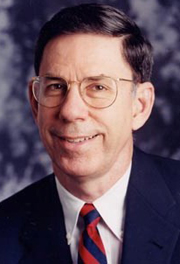
EDITOR’S NOTE: This story has been corrected in paragraphs 1, 5, 10 since its original publishing date.
OXFORD, England (BP)–Once billed as “the most dangerous man in Mississippi,” former Ku Klux Klan member and terrorist Tom Tarrants became a Christian while in prison for attempted bombing and now serves as president of the C.S. Lewis Institute in Washington, D.C.
Tarrants shared his testimony with a group of New Orleans Baptist Theological Seminary faculty, students and friends as part of this summer’s study program at England’s Oxford University. The NOBTS program offers seminary course credit and the opportunity to study under evangelical thinkers in combination with visiting religious and historic sites in England and Scotland.
Born and raised in Mobile, Ala., during the years of racial segregation, Tarrants bitterly opposed the move toward racial equality in the 1960s, directing his hatred toward Jews, whom he believed were involved in a communist plot against America and whom he viewed as God’s enemies.
As a young man in his early 20s, Tarrants aligned himself with Sam Bowers, a man who was later convicted for his part in the murder of three civil rights workers in Philadelphia, Miss. -– the story fictionalized in the movie “Mississippi Burning.” The FBI referred to Bowers’ group, the White Knights of the Ku Klux Klan, as the most violent right-wing terrorist group in the nation.
As an operative for the White Knights, Tarrants was reportedly involved in some 30 bombings of synagogues, churches and homes before being apprehended in an FBI sting operation in Meridian, Miss. In the ensuing shootout between Tarrants and law enforcement officers, Tarrants’ female accomplice was killed and he was shot four times, almost ending his life.
After months of recovery, Tarrants began a 30-year sentence in the Mississippi State Penitentiary at Parchman, one of the most volatile prisons in the nation at the time. He escaped shortly after being incarcerated but was apprehended in yet another shootout that took the life of another accomplice.
His only diversion from prison life was to retreat into reading. One day Tarrants picked up a Bible. The words of Jesus haunted him: “What does it profit a man if he gains the whole world and loses his soul?”
Although he had attended a Southern Baptist church as a child, Tarrants realized he was not a Christian and his life had been a contradiction to biblical teaching. Alone in his cell, Tarrants gave his broken life to Christ. He renounced his racism and hatred and committed his life in service to Christ and mankind.
The realization that he had only narrowly escaped death when he was apprehended convinced him that God had another purpose for his life.
Later, Tarrants found out that the wife of an FBI agent involved in his capture had been praying for his salvation for two years. After his conversion, the FBI agent and his wife, along with others who had been the targets of his hatred, were instrumental in securing his release after eight years in prison.
Tarrants then earned college and seminary degrees and served in various ministry positions, including a co-pastorate at the evangelical Christ our Shepherd Church in Washington, D.C.
Tarrants has authored the book, “The Conversion of a Klansman,” and coauthored “He’s My Brother” with African American evangelical leader John Perkins.
Once a crusader for hate, Tarrants now, as president of the C.S. Lewis Institute, fills a role of educating and equipping those who, like Lewis, want to defend their faith and impact their world with truth.
C.S. Lewis, Tarrants said, was a radical disciple of Jesus who happened to be an Oxford don and a brilliantly gifted writer. Tarrants reminded the NOBTS group to give all to God -– both heart and mind. Tarrants told them Lewis believed “that true knowledge of God comes from obedience.”
“I was deeply encouraged to hear how a single biblical encounter broke through years of insincerity and hatred to transform a man’s life beyond recognition,” NOBTS student Jason Palmer said of Tarrants’ testimony.
Tarrants’ story resounded with the NOBTS group due to the school’s prison education efforts. NOBTS recently began an extension program for inmates at Parchman, the very place where Tarrants made his commitment to Christ. The program is similar to the highly successful NOBTS program at Louisiana State Penitentiary in Angola, La.
–30–

















